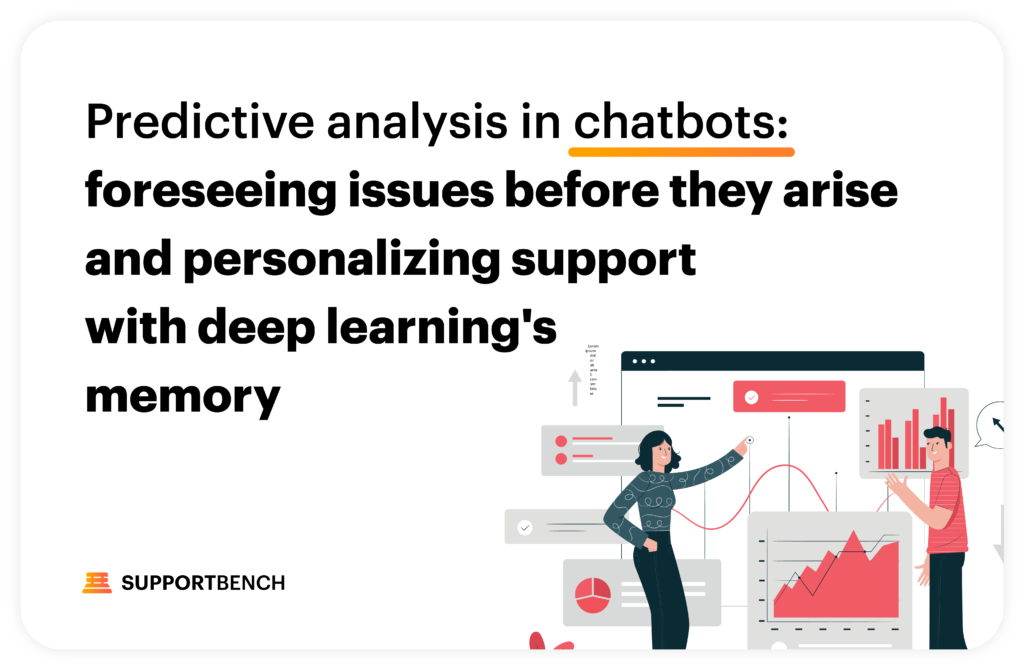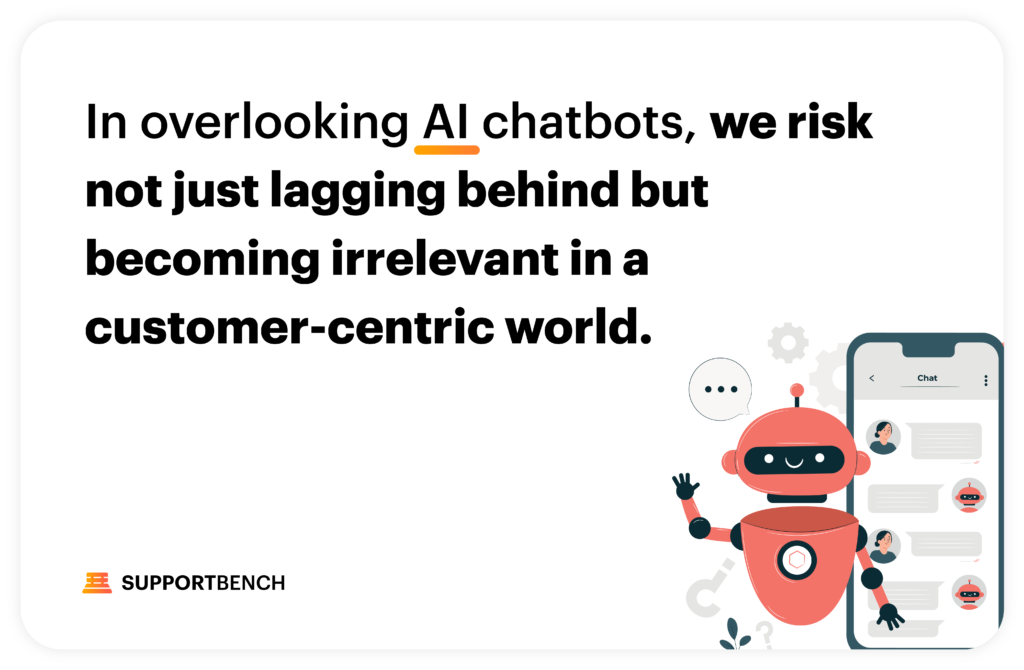The transformative power of Artificial Intelligence (AI) is reshaping industries, and nowhere is this potential more palpable than in customer support. Chatbots, driven by AI, offer a tantalizing promise: instant, round-the-clock support, and intelligent responses tailored to the individual needs of the customer. But what does it truly mean for businesses, especially in the enterprise arena?
A 2022 report by Gartner suggests that AI chatbots will power 85% of all customer service interactions by 2025. It’s clear the world is rapidly moving toward an AI-dominated customer service landscape.
“AI is not just another piece of technology; it’s fundamentally reshaping the way we engage with our customers.” – Satya Nadella, CEO of Microsoft.
Now, for support leaders aiming to be on the cutting edge, understanding and harnessing the power of AI chatbots can be a game-changer. Here are six actionable insights to help you elevate your team’s efficiency and redefine your support strategy:
Prioritize Pre-emptive Support with Predictive Analysis

Predictive analysis allows chatbots to foresee potential issues before they escalate, based on past interactions and data patterns. This means resolving concerns before the customer even realizes there’s a problem.
I mean, imagine a user frequently accessing a particular section of your software. An AI chatbot can proactively reach out, offering tips or tutorials related to that function. This not only enhances user experience but prevents potential tickets.
And for B2B enterprises, pre-emptive support can be a crucial differentiator. When your software or service plays a vital role in your client’s operations, proactive problem-solving can mean saving them significant time and resources.
Now, you can integrate your chatbot with your CRM or customer usage data, train it to recognize patterns that might indicate confusion or potential challenges and allow for proactive outreach.
Personalize Support with Deep Learning
Deep learning allows chatbots to comprehend context better, facilitating more human-like interactions. So, consider a returning customer asking about “the issue from last week.” A traditional chatbot might be lost. But with deep learning, it recalls past interactions, quickly retrieving relevant details and solutions.
And as for enterprises, personal touches most certainly matter. A chatbot that remembers past interactions provides a consistent and personalized support experience, reinforcing trust.
We can now implement deep learning algorithms to your chatbot, feeding it past customer interactions, so it learns and grows with every ticket.
Seamless Handoffs to Human Agents
No matter how advanced, chatbots can’t solve every problem. But they can facilitate a smooth transition to human agents when needed. If a chatbot encounters an issue it can’t resolve, it could provide a detailed summary to a human agent, ensuring they have all necessary information before engaging with the customer.
Time is most certainly money in the B2B world. Ensuring a customer doesn’t have to repeat themselves can dramatically boost satisfaction and efficiency. You simply need to create a protocol where unresolved chatbot interactions are seamlessly handed over to human agents, with a full history and context provided.
Emphasize Continuous Learning
The best AI chatbots are always evolving, constantly learning from every interaction. Every failed interaction or customer dissatisfaction could and should be a learning opportunity. Chatbots can be trained to recognize their shortcomings and adjust. In the enterprise world, needs and challenges evolve. A chatbot that continuously adapts is invaluable. Simply implementing regular reviews of chatbot interactions, identifying areas of improvement and retraining the AI accordingly.
Ensure Omni-channel Integration
B2B customers might interact across various platforms. Your chatbot must be omnipresent. For instance, a client might start a conversation via email, then switch to chat, and finally a phone call. All these touchpoints should be seamlessly integrated. And, we know, B2B enterprise customers value consistency. An omni-channel chatbot experience ensures no matter where the interaction starts, it remains consistent. You just need to integrate your chatbot across all support channels, ensuring data and context travel with the customer.
Prioritize Data Security and Compliance
B2B enterprises often deal with sensitive information. Your chatbot should be a fortress, not a liability. If a customer shares sensitive data, the chatbot should recognize and ensure it’s handled per data protection regulations.
Trust is paramount in B2B relationships. A chatbot that ensures data security can be a strong trust signal. If you regularly audit chatbot interactions for data security compliance and implement protocols to handle sensitive information and ensure regular updates to keep abreast of evolving regulations, you stay way ahead of the game.
Consequences of overlooking the power of AI Chatbots

In today’s fast-paced, customer-centric world, expectations are evolving rapidly. The acceptance and demand for immediate, efficient, and personalized customer support are now considered standard, not luxury. Given the surge in these expectations, the integration of AI chatbots in customer support isn’t merely a technological advancement; it’s a strategic imperative. Not everyone see it that way and her are some potentially fatal consequences:
Increased Operational Costs
Without the efficiency of AI chatbots handling a significant volume of queries, human agents will become overwhelmed, leading to a need to hire more staff. This means increased costs in salaries, training, and infrastructure. A well-implemented chatbot can handle multiple interactions simultaneously, something even the most efficient human agent cannot achieve.
Lengthened Response Times
In a world where customers expect instant answers, any delay can lead to frustration. Companies without AI chatbots might struggle to provide immediate responses, especially during peak times or after business hours. This delay not only frustrates customers but can also lead to lost sales opportunities and decreased loyalty.
Limited 24/7 Support
Unlike human agents, chatbots don’t need rest. They can provide consistent support 24/7. Without them, companies might either have to forgo round-the-clock support or invest heavily in night shifts, which can be costly and logistically challenging.
Lack of Proactive Engagement
Modern chatbots don’t just react; they proactively engage customers based on their behavior, offering solutions before a potential problem escalates. Missing out on this means missing opportunities to enhance user experience and demonstrate value.
Stagnant Customer Insights
One of the understated benefits of AI chatbots is their ability to constantly gather and analyze data. Each interaction offers insights into customer behavior, preferences, and pain points. Without this, companies are flying blind, making decisions based on outdated data or intuition rather than concrete insights.
Diminished Competitive Edge
As more and more companies integrate AI chatbots into their support structure, those that don’t will find themselves lagging. Offering superior customer support can be a significant differentiator in many industries. Failing to innovate can lead to a loss of market share.
Eroding Customer Loyalty and Trust
Today’s B2B customers value efficiency, consistency, and personalization. If they feel their issues are not addressed promptly or if they have to repeat themselves multiple times across touchpoints, their trust in the company erodes. Over time, this can lead to customer attrition.
In financial terms, the consequences can be severe. Consider the cost of acquiring a new customer compared to retaining an existing one. With diminished loyalty and trust, customer acquisition costs can skyrocket, while lifetime value plummets.
Moreover, it’s worth noting that in the B2B space, word-of-mouth and industry reputation are crucial. A single bad experience can lead not just to the loss of one customer but can deter potential clients. The inverse is also true; superior support can lead to referrals and organic growth.
In conclusion, while AI chatbots are a significant investment, the cost of ignoring them is substantially higher. In the quest for sustainable growth, customer satisfaction, and operational efficiency, they are not just desirable; they’re indispensable.
Platforms like Supportbench aren’t merely about leveraging technology for technology’s sake. They recognize the profound strategic and financial implications of modern customer support. By integrating AI capabilities, they’re not just staying ahead of the curve; they’re defining it, ensuring that customer support operations don’t just solve problems but add significant value and drive growth.











